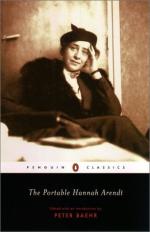|
This section contains 5,987 words (approx. 20 pages at 300 words per page) |

|
SOURCE: "Hannah Arendt and the Politics of Evil," in Judaism, Vol. 37, No. 3, Summer, 1988, pp. 264-75.
In the following essay, Lang explains how the relation between personal conscience or religious commitment and public or civic life informs Arendt's conception of modern totalitarianism.
In the 20th century the position of the German Jewish community was to be one of unusual complexity, of powerful ironies and, ultimately, of great disruption and pain. On the one hand, the ideals nourished by the Enlightenment, emerging in the last part of the 18th Century, and represented in Germany by such figures as Kant, Lessing, and Goethe, had spoken eloquently about the dignity of man, about the principles of civic equality and the inalienable rights shared by all persons. The hopeful statements of these ideals, and the political changes which accompanied them, produced a strong sense of identification on the part of German Jews in...
|
This section contains 5,987 words (approx. 20 pages at 300 words per page) |

|


